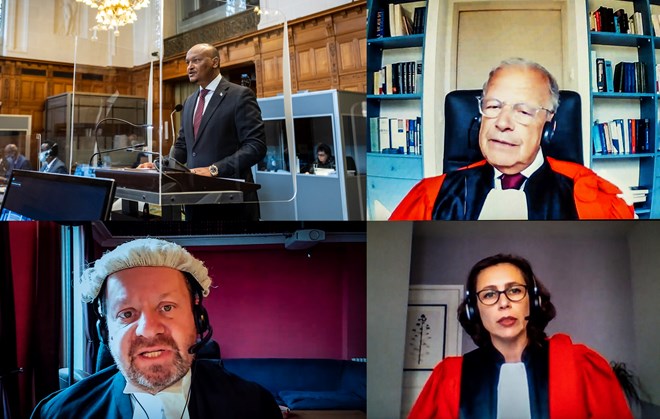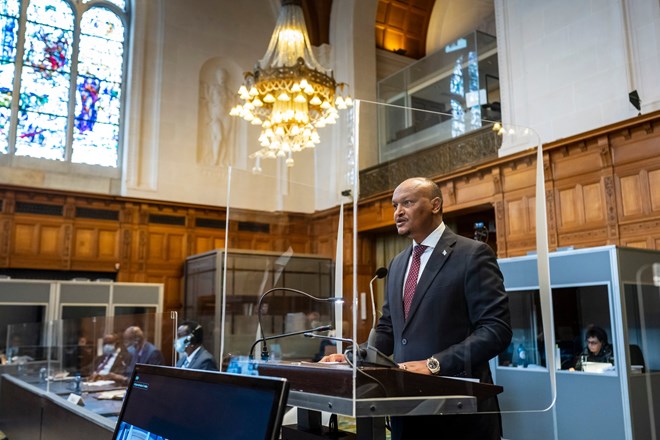
Tuesday March 16, 2021
Members of the Delegation of the Somalia on the first day of the hearings / Thursday 18 March 2021 / Copyright: UN Photo/ICJ-CIJ/Frank van Beek. Courtesy of the ICJ.
Mogadishu (HOL) - The International Court of Justice began oral hearings in the maritime dispute between Somalia and Kenya, despite the latter refusing to participate in the legal proceedings brought against it.
The presiding judge in the case, Joan Donoghue, confirmed that Kenya has pulled out. Kenya was not present in court or via videolink.
Despite Kenya's boycott, the ICJ will still proceed with the hearing. Donoghue said that the court would rely on Kenya's written submissions.
The court refused Kenya's request to address the court for 30-minutes at the start of the hearings.
Kenya newspapers revealed the bombshell decision to not attend the weeklong hearings on Sunday citing the court's bias and its refusal to grant Kenya a fourth postponement. Kenya's Attorney General argued that their new legal team did not have adequate time to prepare in light of COVID-19.
Deputy PM: Kenya has no grounds to complain
Somalia's Deputy Prime Minister Mahdi Mohamed found fault with Kenya's reasoning for pulling out.
"We are deeply concerned that Kenya has decided not to appear at these hearings," said Mahdi Mohammed Gulaid, opening Somalia's case. He said it was "inconsistent with the rule of law" and Kenya's commitment to the court.

Somalia's Deputy Prime Minister Mahdi Mohamed addressed the International Court of Justice on the first day of hearings in the Kenya-Maritime dispute. Copyright: UN Photo/ICJ-CIJ/Frank van Beek. Courtesy of the ICJ.
Kenya "has no grounds to complain about its treatment by the court" after the ICJ granted three previous requests for delays that held up the case by 18 months, he said.
Guled said that Somalia found itself at the Hague after a failed attempt at settling the maritime dispute amicably with Kenya.
"We hoped that it would be possible to settle our dispute with Kenya bilaterally, through negotiations. Unfortunately, that proved impossible."
The international court will decide who has legal jurisdiction over a potentially lucrative, triangular stretch of 100,000 square kilometres of offshore territory believed rich in hydrocarbons and fish. The ruling cannot be appealed, but its enforcement relies on the UN Security Council, of which Kenya is a non-permanent member.
The conflict's origins date back to early April 2009 when both countries agreed to have a UN commission determine the maritime border and decide to work on a diplomatic, out-of-court solution. Kenya registered with the MOU with the Secretariat of the United Nations on June 11, 2009.
On June 23, 2009, barely three months after entering the MOU with Somalia, Kenya reached a favourable agreement with Tanzania. The two countries decided their maritime border would lie line parallel to the line of latitude.
Somalia is arguing that the maritime boundary should follow the direction of the land border and run diagonally. Conversely, Kenya wants it to run parallel to the latitude, as it negotiated with Tanzania in their 2009 agreement.
A maritime border will determine which nation holds the exclusive right to energy resources beneath the sea.
In 2012, Somalia accused Kenya of awarding exploration rights to two European multinational oil and gas companies, Total and Eni.
The Somali government sued Kenya at the ICJ in August 2014 after no progress was made in meetings to settle the conflict.
The dispute has fuelled the deteriorated diplomatic relationship between the two East African neighbours. Mogadishu cut ties off with Nairobi in December 2020, accusing it of interfering in Somalia's internal affairs. Kenya denied the charge.
Somalia will continue its oral presentation on Tuesday between 3 PM and 4:30 PM.
You can watch the full hearing below:
Maritime Delimitation in the Indian Ocean (Somalia v. Kenya) – Public hearings - Monday 15 March 2021 (3 p.m.-6 p.m.) – First round of oral argument of Somalia - PART 1
Maritime Delimitation in the Indian Ocean (Somalia v. Kenya) – Public hearings - Monday 15 March 2021 (3 p.m.-6 p.m.) – First round of oral argument of Somalia - Part 2